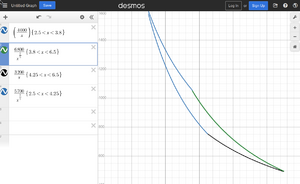Carnot Cycle: Difference between revisions
| Line 2: | Line 2: | ||
== Introduction == | == Introduction == | ||
# Isothermal expansion: Heat is transferred from the hot reservoir to the gas. | # Isothermal expansion (No heat transfer / energy transfers): Heat is transferred from the hot reservoir to the gas. | ||
# Isentropic (reversible adiabatic) expansion: without transfer of heat to or from a system, so that Q = 0, is called adiabatic, and such a system is said to be adiabatically isolated. Eg. the compression of a gas within a cylinder of an engine is assumed to be rapid that little of the system's energy is transferred out as heat to the surroundings. | # Isentropic (reversible adiabatic: Heat transfers / no energy transfer) expansion: without transfer of heat to or from a system, so that Q = 0, is called adiabatic, and such a system is said to be adiabatically isolated. Eg. the compression of a gas within a cylinder of an engine is assumed to be rapid that little of the system's energy is transferred out as heat to the surroundings. | ||
# Isothermal compression | # Isothermal compression | ||
# Isentropic compression | # Isentropic compression | ||
Revision as of 08:03, 17 August 2024
Introduction
- Isothermal expansion (No heat transfer / energy transfers): Heat is transferred from the hot reservoir to the gas.
- Isentropic (reversible adiabatic: Heat transfers / no energy transfer) expansion: without transfer of heat to or from a system, so that Q = 0, is called adiabatic, and such a system is said to be adiabatically isolated. Eg. the compression of a gas within a cylinder of an engine is assumed to be rapid that little of the system's energy is transferred out as heat to the surroundings.
- Isothermal compression
- Isentropic compression
Ideal Gas

, or more genrally polytropic process: , where is different processes depending on the value of the n:
- n = 0: isobaric
- n = ∞: isochoric
- n = 1: isothermal
- n = γ: isentropic
Adiabatic index Failed to parse (Conversion error. Server ("https://wikimedia.org/api/rest_") reported: "Cannot get mml. Server problem."): {\displaystyle \gamma =c_{p}/c_{v}} is for the air 7/5. For the ideal gas we have Failed to parse (SVG (MathML can be enabled via browser plugin): Invalid response ("Math extension cannot connect to Restbase.") from server "https://wikimedia.org/api/rest_v1/":): {\displaystyle p^{1-\gamma} T^\gamma = C} and Failed to parse (SVG (MathML can be enabled via browser plugin): Invalid response ("Math extension cannot connect to Restbase.") from server "https://wikimedia.org/api/rest_v1/":): {\displaystyle TV^{\gamma-1} = C} .
- (n=1) Isothermal compression: T is constant, thus we have Failed to parse (SVG (MathML can be enabled via browser plugin): Invalid response ("Math extension cannot connect to Restbase.") from server "https://wikimedia.org/api/rest_v1/":): {\displaystyle p =C/V } .
- (n=γ) Isentropic Failed to parse (SVG (MathML can be enabled via browser plugin): Invalid response ("Math extension cannot connect to Restbase.") from server "https://wikimedia.org/api/rest_v1/":): {\displaystyle p=C/V^\gamma}

